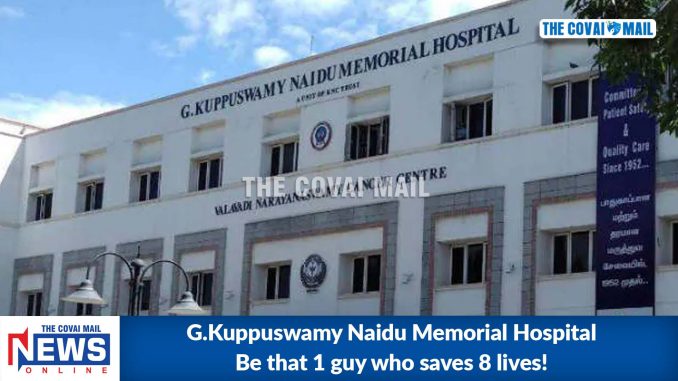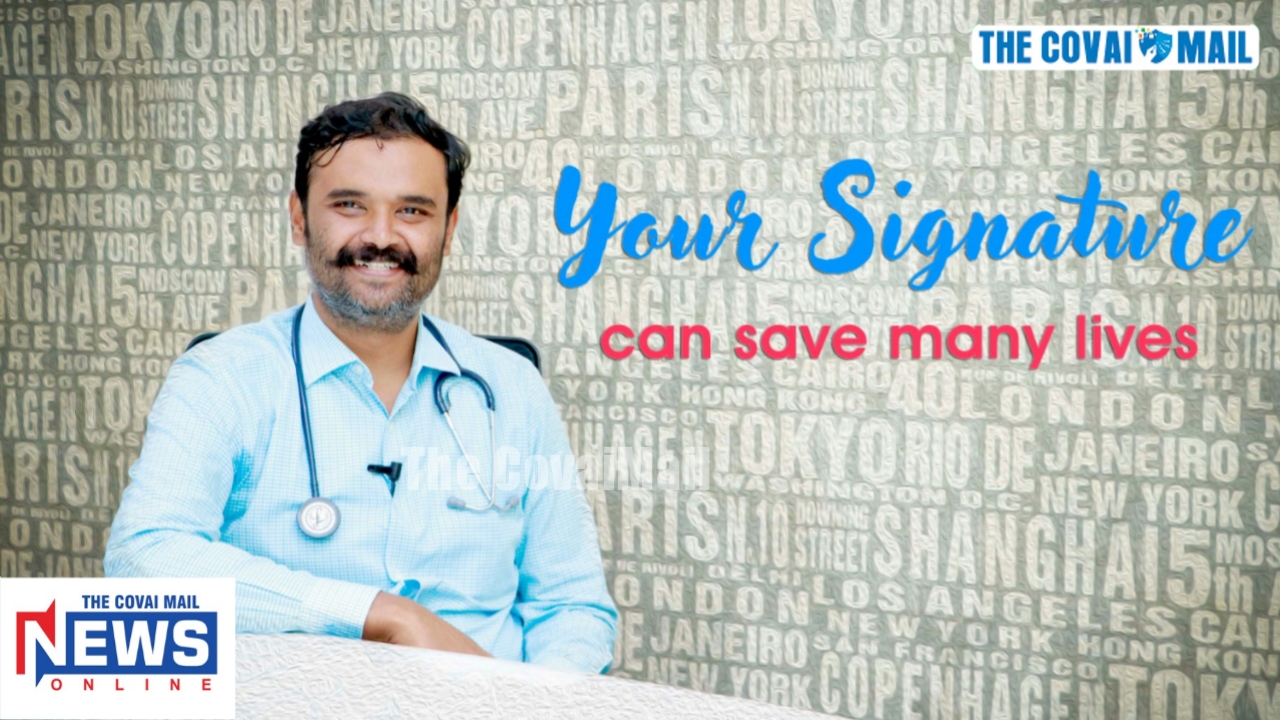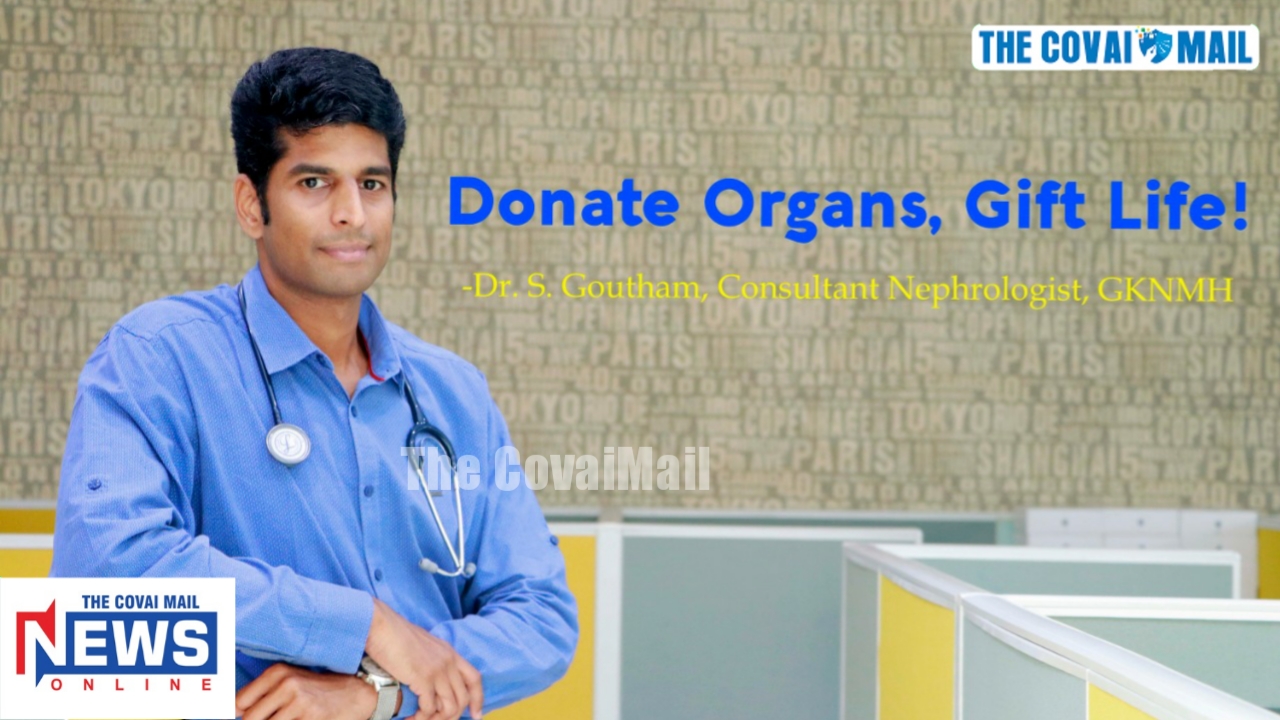
If an individual could add happiness in a helpless person’s life, it is nothing short of a miracle. And believe us when we tell you that we all can bring happiness into the lives of many people if we register as organ donors. There are quite many patients with organ failure waiting for a transplant. Yet, due to various reasons only a small percentage of the patients receive organs.

Though enough awareness about organ donation has been created among the public recently, it doesn’t seem to inspire more people to come forward to become donors. Unnecessary fear and myths regarding organ donation force people to keep away from organ donation. Every year, on August 13th World Organ Donation Day is observed across the world to create a positive attitude on organ donation among people.
For this World Organ Donation Day, Dr. S. Goutham and Dr. K.S. Vengetesh, two doctors from G.Kuppuswamy Naidu Memorial Hospital (GKNMH), who are experts in Kidney related procedures, shared with us information on Organ Donation and a challenging Swap Kidney Transplant Surgery they have done recently.

Your Signature can save many lives
-Dr. K.S. Vengetesh , Consultant Urologist, GKNMH
More than a lakh are waiting!
According to a report by NDTV, in India 1.5 lakh patients wait for kidney transplant, but only 5,000 manage to receive donor kidneys for transplant in reality. Our country falls to meet the number of organs required badly. We see, and hear of, many patients waiting with uncertainty for organs, and some pass away due to non-availability. If more people register as organ donors with TRANSTAN-approved hospitals, a greater number of organs will be available and loss of life could be prevented.
Organs like Kidney and part of liver could be donated by Living Donors, when there is dire need for a transplant amongst the members of a family. On the other hand, Heart, Lungs, Liver etc. can be donated by any healthy people posthumously. When live-donors (that includes family members and near relatives) and Brain-Dead patients’ family members come forward to donate, patients waiting for transplant can breathe a sigh of relief.
Questions & Doubts that prevent donation
The important question that living donors ask is “Will I be able to live healthily after donating my organ?” For instance, when a person agrees to donate his kidney, the hospital will thoroughly examine his health status BP, Sugar level, etc. to assess whether their kidneys are functioning normally and whether they can survive with one kidney life-long. It is only then that they are deemed fit to donate. TRANSTAN, a government, body ensures this.
Donors may ask whether the surgery will be a very difficult one and whether they may have to face challenges in leading their life after the surgery. To be frank, two days after the procedure the donors can get up and look after their daily routine. In about a week to ten days, they can resume their normal life. At GKNMH, we use the laparoscopy method to take the kidney from living donors. The incision made is very minimal, so this helps the patients to get discharged on the third day post-surgery.
A brain-dead person can save up to 8 people, but a common question that family members of the deceased ask is “Will the body appear to be deformed after the organs are harvested?” The reality is; the place of an extracted organ would be neatly covered and would not bear even a small visible damage. A great number of organs go waste, but if people consider donating their organs after death, imagine the number of lives that could be saved!
Our request to everyone
What we at G.Kuppuswamy Naidu Memorial Hospital would like to convey to the public is to consider taking the Organ Donor’s pledge at the Tamil Nadu Government’s TRANSTAN approved hospitals and get the Organ Donor’s card. Your single signature can save many lives when you leave this earth.

Donate Organs, Gift Life!
-Dr. S. Goutham, Consultant Nephrologist, GKNMH
Best Treatment Option for Kidney Failure
The incidence of Kidney Failure has increased in recent times. Transplant Operation is the best treatment for patients whose kidney has failed. Especially if the patient is a youngster, undergoing kidney transplant is the best option, and it would be ideal if a donor volunteers to donate from the patient’s own family.
The government has framed protocols that when family members are not an option here, then the near relatives can donate their kidney. An important thing that should be ensured is the proper-matching of blood group of the donors and recipients.
We have 4 groups – A, B, AB & O. The luckiest group here is AB. Doctors say that donors belonging to any group can donate to the recipients with AB blood group. For A blood group and B blood group recipients, either their respective blood group or O group donors can give. But for O group recipients only O group donors can donate.
It is only after a thorough medical examination for finding whether the donors’ body could bear the surgery and assessing whether they could continue their life with a single kidney that the donors are allowed to provide their kidney.
The Next Best Alternatives
When the family members or relatives are unable to find a donor, the next option they have is Cadaver Transplant Program which involves transplanting the kidneys of brain-dead patients. In Tamil Nadu, an average patient has to wait for 3-4 years to get a kidney through this way.
To prevent the patient’s health from worsening and to reduce the waiting time, there are a few other alternatives available: they are ABO Incompatible Transplant and Swap Transplant.
In ABO Incompatible Kidney Transplant, the donor’s and recipient’s blood type would not match but with the medical advancements, a transplant between the two is made possible.
In many cases, a patient will get a donor in his/her family, but, as I said earlier, their blood groups would not match. When a similar patient elsewhere has trouble identifying a donor because of the mismatch of blood group in his/her family, these two donor families can help each other by swapping the kidneys. This is what we call as Swap Kidney Transplant. It is commonly done abroad, and we did a successful swap procedure recently.
Challenges faced during Swap Transplant
Swap Transplant has many challenges. Medical Challenge, Surgical Challenge and Social Challenge. We’ll try to avoid age mismatch. Both donors in the family should be of similar age. They must not have comorbidities. We’ll try to manage and match the donor-recipient profile. We overcame this medical challenge successfully. In this swap transplant, the number of patients undergoing surgery is 4. So, we needed more anesthesia specialists, a strong surgical team, simultaneously-functioning Operation Theaters etc. Our hospital infrastructure provided us the support to overcome this surgical challenge.
On a social perspective, one patient may face problems while in the case of other the surgery may be smooth. One family may incur less cost while another may not. Along with us, Transplant coordinator, Medical/Surgical Team and Hospital Administrative team all get involved to avoid any hurdles affecting the surgeries.
Doing Swap Transplant at this pandemic period was a big challenge because for a month, all transplants were halted by the government. National Organ and Tissue Transplant Organization – (NOTTO) gave guidelines to conduct transplants. Following that and our own COVID-Task Force’s suggestion, our transplant team conducted the transplant after ensuring that the donors, recipients and their attendants were all tested COVID-Negative.
The nursing staff who would look after them from the time of surgery to recovery were also tested for COVID, and a separate room was provided for them so that they could be present whenever a medical need arose. Food was provided to the donors & recipients without seeking much human assistance. Likewise, required medicines were sent via Pneumatic System in the hospital to minimize human contact. They were sterilized before being administered to them. We made such a system to ensure patient safety. All the 4 are healthy now.
There are many alternatives available for patients waiting for kidney transplant. They need to explore these options and not lose hope. What I would like to tell the public is that if many register with TRANSTAN as organ donors, they could help many people out and gift them life.
For questions related to organ donation & transplant procedures you may contact Transplant Co-Ordinator of GKNMH – 8220044838.
